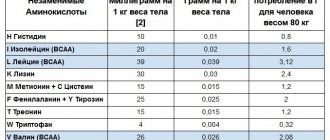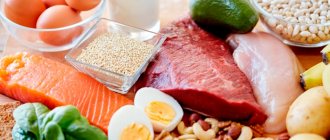Protein is every bodybuilder's favorite nutrient—and for good reason. Protein is very important, super filling and fantastically anabolic. Protein is amazing... but you're probably consuming too much of it.
Like most myths, the belief that you need to consume 1 g/lb (~2.2 g/kg) of body weight has become so pervasive in the fitness world that its validity is rarely challenged. Surprisingly, very few people think about the somewhat strange fact that the optimal amount of protein our bodies can absorb in a day is exactly 1 g/lb. But is it? Let's take a look at the scientific literature on the effects of daily protein intake and see if consuming 1 g/lb (2.2 g/kg) is really the optimal amount for maximizing muscle gains.
Research on Optimal Protein Intake
All values in the list of studies below are expressed in grams of protein per pound of body weight per day. All studies controlled energy intake either on the basis of individual requirements or with energy intakes set to be equivalent across all experimental conditions, with differences between groups only in the proportion of protein. If experiments relied on unreliable methods, such as nitrogen balance as a proxy for changes in lean body mass, I included them as long as sweating and dietary adjustment were controlled:
- In 1992, Tarnopolskyetal found no differences over a two-week period in total body protein synthesis or lean body mass index in strength athletes consuming 0.64 g/lb (1.4 g/kg) or 1.10 g/lb (2. 42 g/kg). Protein oxidation increased in the high protein intake group, indicating nutrient overload.
- In 1988, Walbergetal reported that 0.73 g/lb (1.6 g/kg) was sufficient to maintain positive nitrogen balance in weightlifters over a one-week weight loss period.
- In 1988, Tarnopolskyetal found that only 0.37 g/lb (0.8 g/kg) was required to maintain positive nitrogen balance in high-level bodybuilders (5 years of training, possible prior androgen use) for 10 days. .45 g/lb (0.99 g/kg) is sufficient to maintain lean body mass for more than 2 weeks. The authors note that for bodybuilders, 0.55 g/lb (1.2 g/kg) is sufficient.
- In 1992, Lemonetal found no difference in gains in strength and muscle mass in novice bodybuilders consuming 0.61 g/lb (1.34 g/kg) or 1.19 g/lb (2.6 g/kg) for 4 weeks. ). Based on nitrogen balance data, the authors recommend 0.75 g/lb (1.65 g/kg).
- In 2006, Hoffmanetal found no differences in body composition, strength, or resting hormone concentrations among strength athletes consuming 0.77 g/lb (1.7 g/kg) or >0.91 g/lb (2.0 g) /kg) for a period of 3 months.
So, there are some long-standing studies based on nitrogen balance that suggest (but never find) a benefit from high protein intake, but as I mentioned above, these studies had methodological inaccuracies. Nitrogen balance is a notoriously unreliable method for assessing changes in lean body mass, especially high values, and these experiments did not control for sweating or dietary adaptation. Significant changes in dietary protein intake are known to result in a negative nitrogen balance 2 weeks after the change, even in the case of significant protein and energy intake. Additionally, these studies did not exclude users of androgenic anabolic steroids, although they were conducted on competitive athletes (Tarnopolskyetal, 1988). Unsurprisingly, many of these studies are not translated and remain obscured in abstract form on PubMed, if they appear there at all.
The Bayesian bodybuilder tramples methodological errors into the ground.
Based on the studies discussed above, many reviews have concluded that 0.82 g/lb (1.8 g/kg) is the upper limit of the benefits of protein intake on body composition (Phillips & Van Loon, 2011). These recommendations often include a double 95% confidence level, meaning they took into account the highest mean intake at which benefits were observed and then added two standard deviations to that level to be absolutely certain of the maximum benefit from additional protein intake. Thus, consuming 1 g/lb (2.2 g/kg) is a pointless oversafety, since 0.82 g/lb (1.8 g/kg) is already very safe.
The figure below summarizes the literature. As you can see, 1.8 g/kg (0.82 g/lb) is the point beyond which there is no benefit from consuming additional protein.
RDA – recommended daily allowance; SV - athletes in endurance sports; SS – athletes of power sports.
What is metabolism?
The set of biochemical processes occurring in the human body, called metabolism, includes anabolism and catabolism.
Anabolism is the process of synthesis of large molecules.
Catabolism is the process by which large molecules, including muscle proteins, are broken down into smaller molecules. Proteins in the cells of the body are broken down by enzymes into amino acids, most of which are used for new protein synthesis.
During the day, about 200 grams breaks down in the body. existing protein, most of which is recombined. In the adult human body there is parity between synthesis and catalysis. In children, synthesis predominates, which leads to the accumulation of protein in the body and is the basis for healthy development and growth. With age, on the contrary, breakdown begins to prevail over synthesis, so for older athletes the need for additional protein increases.
For a person who is not actively involved in sports, it is not difficult to get the required amount of protein from food. The consumption rate for an ordinary healthy person is 0.8 -1 g per kg of weight.
For people involved in sports, the situation is a little more complicated. Protein is not “fuel” for physical activity. The body needs it as a means of recovery. Physical activity activates the process of protein breakdown in muscles. With the help of protein intake, the athlete needs to ensure the accumulation of protein in the body. If a sufficient amount of protein is not supplied from food, it will be impossible to ensure that anabolism exceeds catabolism, and it will be impossible to achieve the desired speed-strength or other goals set by the athlete.
But I'm more prepared than these guys!
Another opinion that is often heard is that people need more protein because they are more experienced than the study population. Well, Tarnopolskyetal (1988) used experienced bodybuilders and found that they needed less protein than beginners.
In fact, several studies have suggested that the more experienced you are, the less protein you need (Rennie & Tipton, 2000; Hartman, Moore & Phillips, 2006; Moore et al., 2007).
Every person constantly undergoes protein synthesis and breakdown. Weight training leads to an increase in breakdown and synthesis, normally the balance shifts towards synthesis. As your training progresses, your body becomes more effective at inhibiting protein breakdown due to training. Therefore, less and less protein is required for recovery, this increases nitrogen retention, which means less protein is subsequently needed for optimal growth.
In addition, the more you train, the less protein synthesis increases after exercise. As you become more muscular and closer to your genetic limit, less muscle is built after exercise. It's intuitive. The less muscle you can build, the less protein you need for optimal growth. It wouldn't make any sense if the body needed more protein to build less muscle, especially since the body metabolizes protein more efficiently.
The role of protein foods in an athlete’s diet for muscle building
Protein compounds are present in almost all substructures of our body: muscle and bone tissue, blood vessels, blood, skin, hair and nail plates. A portion of such proteins regularly breaks down under the influence of natural aging processes and needs to be replaced in a timely manner.
Note! About half of the protein found in muscle tissue is broken down and replaced within 150 days.
The mechanisms of protein replacement for muscle recovery are as streamlined as possible and occur according to the following plan:
- During digestion, the protein that comes with food is broken down into its component parts (amino acids). This work is carried out by other proteins in the human body - enzymes.
- Next, the amino acids enter the cells and are processed into the necessary types of protein.
- Then tissue self-healing occurs in problem areas.
This tissue regeneration system is unique. However, to replace and produce new protein compounds, a constant supply of proteins from food is necessary. Food sources also contain nitrogenous molecules, which are necessary for the synthesis of new protein.
Protein is a key element in the processes of recovery and muscle formation. At the same time, the ratio between protein synthesis and breakdown is extremely important for the body - for the appearance of lean muscle tissue, the first must prevail over the second. The processes of formation of its own protein in muscle fibers are regulated by signals from the brain. During active strength training, commands are sent from the brain to produce new protein, which means gradual muscle growth.
To do this, a sufficient amount of amino acids must be present in the body immediately after training and in the next 2 days for the active process of anabolism.
Be sure to check out: Sports nutrition for gaining muscle mass at home Side effects of creatine on the body Nutrition and weight. Rules for creating a diet for men building muscle. Features of ectomorph nutrition during weight training.
What about during the period of weight loss?
The last argument that is often heard is that the value may be appropriate during the period of gaining or maintaining muscle mass, but when losing weight, more protein is required to maintain muscle mass. Walbergetal (1988) studied weightlifters during weight loss and concluded that 0.73 g/lb (1.6 g/kg) was sufficient to maintain lean body mass.
Perhaps even more revealing is the 2008 Pikoskyetal experiment. The researchers recruited a group of endurance athletes and asked them to consume 0.41 or 0.82 g/lb (0.9 or 1.8 g/kg) of protein per day. They also reduced their intake by 1,000 kilocalories during their peak training periods. So these guys were literally running at a 1000 calorie deficit while dramatically increasing their training volume. Talk about a catabolic state... Of course, the nitrogen balance in the low protein group became dramatically negative. However, a protein intake of 0.82 g/lb (1.8 g/kg) in the other group completely protected subjects from muscle loss. Nitrogen balance, general metabolism in the body and protein synthesis remained unchanged.
A more detailed review of the literature on optimal protein intake under energy deficit conditions can be found
The estimated differences in the nitrogen-sparing effect of carbohydrates and fats are also small (McCargar et al. 1989; Millward, 1989). Although in fact protein is not saved. Only protein saves protein. I believe the idea of protein conservation comes from a misinterpretation of scientific data on nitrogen balance showing greater muscle loss with a larger calorie deficit. A simple explanation for these findings is that the more total body mass you lose, the greater the decrease in lean mass. Nothing surprising.
Thus, there is simply no empirically based reason to believe that we need to consume more than 0.82 g/lb (1.8 g/kg) during weight loss. In any case, it is reasonable to assume that the body can use more protein during the period of mass gain, as more muscle is built and many other nutrients are consumed, which makes it possible to utilize more protein.
People who may actually need more protein than 0.82 g/lb (1.8 g/kg) include those starting out or having unusually high levels of anabolic hormones. Androgen or growth hormone users certainly fall into this category, and I would not rule out a similar possibility for some teenagers. If you have reached peak testosterone production during your growth period (height), unusually high testosterone and growth hormone levels may increase your protein needs. Or not. There are no studies that confirm this. Those rare people with a fantastic genetic predisposition for bodybuilding may also need it, but unless your father just happened to be a silverback gorilla, then it's more likely that your needs are similar to other people.
Myth Source 1 g/lb (2.2 g/kg)
Why then does everyone say you need to consume 1 g/lb (2.2 g/kg)? Aside from the facts, which do not provide any good reason to believe the myth, there is a tendency for myths to be perpetuated through conformity and tradition, and the fitness industry is inundated with myths, here are some plausible reasons for confusion:
- People imitate the eating habits of androgen-fuelled bodybuilders. Steroids allow you to absorb much more protein than you normally can.
- People are basing recommendations on flawed nitrogen balance studies from a time when the world was still flat.
- Heuristic, the more the merrier. There is so much research showing the benefits of protein for you that it's hard not to think more is better.
- Supplement companies have a very clear financial incentive to promote the belief that you need more protein than you actually do. There are several industry-sponsored studies showing the absolutely miraculous benefits of consuming more protein (check out the Cribb studies for an example).
- People don't want to mess with decimal numbers and simply round to the nearest convenient whole number, which is what happens with the easy-to-remember number 1.
More is often better, but in some cases it's just overkill.
One final note, there is nothing wrong or unhealthy about consuming more protein than your body can use to build muscle. The excess will simply be used as energy. However, protein sources tend to be more expensive than other energy sources and variety is preferable to your health, so satiety and dietary preferences are the only reasons I would want to consume protein excessively.
Helpful information
- Normally, there is no benefit from consuming more than 0.82 g/lb (1.8 g/kg) of protein per day to prevent muscle loss or gain after the initial training period or for training without steroids. This value is a bit of a stretch, as most studies have found no benefit from intakes above 0.64 g/lb (1.4 g/kg).
- Optimal protein intake decreases with training experience, due to increased effectiveness in preventing protein breakdown from training and lower protein requirements due to the reduced amount of muscle you can build after each session.
Source:
How much protein does an athlete need?
How much protein does an athlete need? Does it make a difference when it arrives?
In order for physical activity not to destroy muscles, but to develop them, it is important to ensure the supply of proteins during the day. This constant supply of protein will prevent its breakdown in the muscles. Athletes who want to build muscle mass, develop greater muscle strength, or adolescent athletes who are in an active growth phase are recommended to consume 0.25-0.3 g of protein per 1 kg of weight 4-6 times a day. An athlete weighing 75 kg should receive 20-25 g of protein at each meal. This amount can be obtained, for example, from: 200 g of cottage cheese; 100 g chicken fillet; 3 eggs; 100 g salmon; 1 serving of protein shake.
For adequate recovery, one of these meals should occur within the next two hours after exercise, provided that another workout is not planned on the same day. With a regimen that includes two workouts per day, the intake time is reduced to 30 minutes, immediately after the workout. The liquid form is the most easily digestible, so the best option for a recovery meal is a carbohydrate-protein cocktail, which simultaneously compensates for increased protein catalysis and restores glucose and glycogen levels.
You need to understand that it is necessary to ensure a positive balance between protein catabolism and anabolism, and not “eat as much protein as possible.” Eating protein by itself does not lead to muscle growth; there is no point in eating as much of it as possible.










